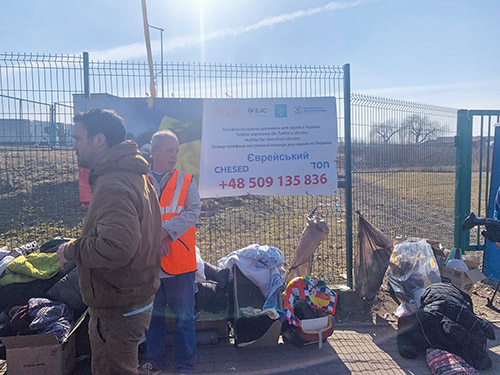
To put a 2023 spin on a Charles Dickens quote: this is the worst of times and the best of times.
The worst, because of the unspeakable depravity and evil of the Russian invasion of Ukraine on February 24 last year. Because of the millions of refugees, the suffering, the absolute devastation caused by the attack. And yet, also, the best of times. Because we have seen absolute goodness. We have seen donors, volunteers and professionals stepping up to care, and to save.
Last week I drove in Moldova to meet Ukrainian refugees who were resettled in Chișinău, once Kishinev. Millions of refugees, fleeing from Russian bombing of residential areas, hospitals, schools, fled west to countries like Moldova. Earlier this year, days after the Russian invasion, I went with David Saginaw, our Greater MetroWest Jewish Federation president, to the Polish-Ukrainian border and there we saw tens of thousands of refugees fleeing to safety. All women and children and nearly no men. All crossing the borders in absolute silence. It was a shattering experience, one that I will never forget.
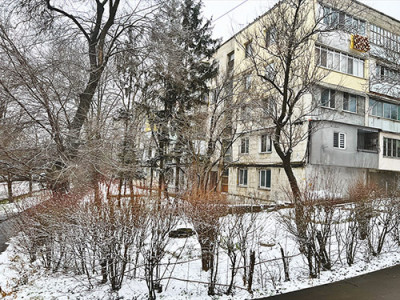
That was 11 months ago. Last week was somewhat different.
I had come after a long weekend. A few days before traveling, I met with Jewish students at the Rutgers Newark campus who are facing an atmosphere of intimidation and antisemitism. We face a campus administration that will not collaborate or provide even the basic safe environment that our students need. I believe that as a Jewish community, it’s our responsibility to advocate for that safety, to push the campus administration and to meet with the students to hear their needs and figure out ways to help them.
On the morning of my flight, as you probably know, a Molotov cocktail was thrown—but thankfully not ignited—at the entrance to Temple Ner Tamid in Bloomfield. I know you share my relief that the perpetrator was arrested and is being questioned by law enforcement, for whose efforts we are deeply grateful. As with the 85 other synagogues in our Greater MetroWest community, our Jewish Federation provides security training, lobbying for Homeland Security funds for security improvements, and for our community’s early warning alert system.
As I got on the plane to Moldova, both of our senators had already called me and Rabbi Katz at Ner Tamid, and there were more calls, including from local Congresswoman Mikie Sherrill and others, offering help and support. But not for a moment did I think of not getting on the plane. Because the same responsibility we have as a Jewish community to care for those in need applies to Jews coming out of Ukraine, too. There is one Jewish world, interconnected and intertwined.
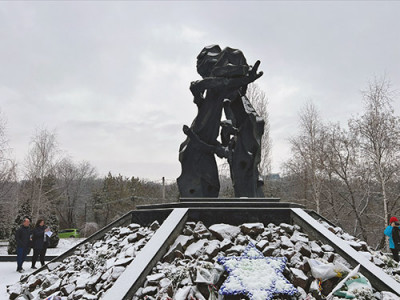
In Chișinău, I met Galina, a 90-year old Ukrainian Jewish refugee. She had fled the brutal Russian occupation of Kherson with her daughter and two grandchildren. When the Russians invaded last year, they started entering apartment building courtyards, shooting out the windows and ordering people into basements. Those people would never be seen again. So it was time to flee.
Galina and her family drove through two dozen checkpoints to get to Odessa, calling a hotline run by Jewish Federation partners to get a shelter. As they unpacked, rockets and bombs fell nearby, and several of their friends who had also come from Kherson were killed. So they fled west, to Moldova, the next morning, to another Jewish Federation-supported shelter, and then an apartment. Each month she and her family receive basic food and medical support, winter relief supplies in the coldest months, trauma counseling and more.
This wasn’t Galina’s first evacuation. She fled the Nazis in 1941 as they invaded her home in Krasnodar in Russia. She was a 9-year-old, smaller than the shovel she used when forced by Nazi troops to dig anti-tank ditches in 1942 before the family escaped to Crimea. As they dodged artillery shells and bullets, they saw the bodies lying around the streets, and heard later that a Nazi SS unit, rounding up Jews, arrived at their house just seconds after they had left.
And now, here we are, 80 years later. It is not the same perpetrators. The crimes are different. History does not repeat itself. But sometimes it rhymes.
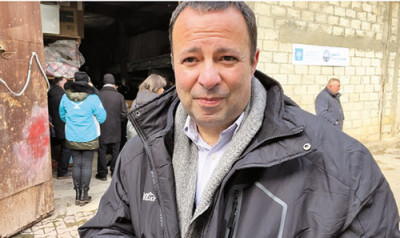
Remember this. When you arrive at the border crossing from Ukraine, you’re exhausted. You have absolutely nothing. But it was there that I witnessed again the very best of humanity in response. Moldova’s 2.5 million residents took in over 750,000 refugees. Its 12,000 Jewish community members took in 17,000 Jewish refugees! Thousands of professionals and volunteers at the border provided food, medical care, bringing refugees to shelter and transportation. Caring for children, the frail elderly, and more. Among them, amazing professionals from our own Jewish Federation partner agencies, especially the Joint Distribution Committee and the Jewish Agency. They took in Jewish and non-Jewish refugees, giving food, medical care, shelter, transportation, security and so much more. There are some 40,000 frail elderly Holocaust survivors, Jewish families and those with special needs who are helped inside Ukraine each and every day by our Jewish Federation, with food, medicine, home care and more.
This is deep leadership, deep commitment. Keeping the fires of hope alive through day and night. It is heroism, gvura. I use that word carefully. It has been cheapened by the elevation of celebrities and sports figures as “heroes.” But there is a great difference between being well known and being heroic. Sometimes, we think, this is not the age of heroes. But that’s not true. I’ve met them, and they are on the ground right now, where we need them to be.
Tens of thousands of Jews have made aliyah in Federation-supported flights from these countries in the past year. There will be many more in the months ahead, and we’ll support these efforts from Europe and, once they get there, we’ll support their successful integration, their klitah, into Israeli society. And tens of thousands of Jewish refugees who are being helped, right now, with food and shelter and trauma counseling, thanks to your support of your local Jewish Federation.
Most of our Jewish Federation’s efforts are aimed at the Jewish community. I do believe that this is our responsibility, and that, although Jews are generous and kind and philanthropic, and give to non-Jewish charities as we should, few others will give to support elderly Shoah survivors or Jewish families at risk except for us. Few others will help the tens of thousands of Ukrainian or Belarussian or Russian Jews make aliyah to safety, or provide security at Jewish buildings on the border, or buses to the airport. Only you.
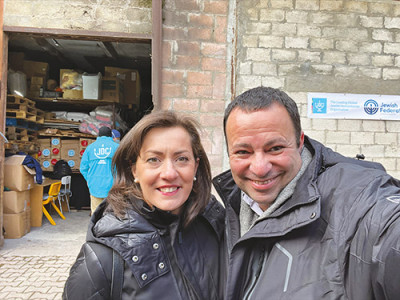
At one of dozens of Federation-supported relief centers we’ve helped set up at the borders, I saw what it means when we help non-Jews, too. We’re not turning anyone away, and when someone in need comes, you help that person, because we have an obligation to care for those in need. At a dinner earlier last year with the Chief Rabbi of Poland, Rabbi Michael Schudrich, I asked him about this and he said, “I don’t know if every one of the refugees we help is Jewish. But I do know that every one of them is a child of God, created B’tzelem Elohim, in the Divine image.”
Walking through Kishinev, driving past the sites of the historic pogrom, of the expulsions, the massacres, the Nazi attacks … all of this was hard. It was heavy with the burden of our history. Of our parents and grandparents, those who were lost and murdered. We cannot disregard the weight of Jewish history. We are all links in this chain of remembrance. And so many of us are fortunate to be here, today, because of a simple twist of fate. A parent, or a grandparent, who turned left instead of right. Who came here, instead of there.
At borders across southern and western Ukraine there are signs in Russian, Yiddish, Ukrainian, Polish and more. And these signs have the freephone number of Federation-supported call centers across Europe and from Israel. And if you’re Jewish and you call this number, we can direct you to shelter, and food, and aliyah and rescue. From these signs, follow these directions: Turn left. Come here. It is the 21st-century version of your refugee parents and grandparents moving to safety. Only this time it is much more deliberate. Much better organized.
For the first time in Jewish history, every single Jew who is a refugee, who is escaping from danger—every single one—has been saved. Rescued. If you know anything about Jewish history, you’ll recognize what an unprecedented, astonishing statement that is. If you’re a donor to the Ukraine Relief fund last year, and the United Jewish Appeal of our Jewish Federations this year, across New Jersey, know that you have done this. Those organizations on the ground—some 50 of them, supported by the tens of millions of dollars raised by Jewish Federations—are equipped with the tools to do the job because of you.
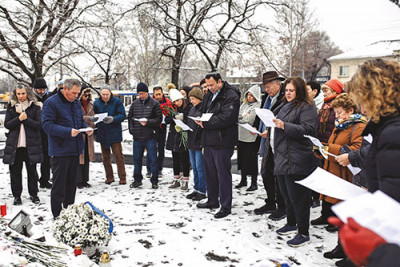
Even if the war comes to a cease-fire soon, which is not likely, the refugee crisis will continue to expand. Those refugees—especially the Jewish ones—will need our help, from our own sense of mishpacha, family and chiyuv, obligation. As more NATO arms and equipment arrive in the months ahead, the Russians will increasingly feel the pressure to attack. They are already starting in the Bakhmut area of the Donbas in the east. What most charities need right now is flexible infrastructure funding. To turn quickly to send a Federation-supported staff person to a conflict area. To make sure we can get people through the border crossings. To bring medicines, to pay for buses and flights and more. To pay for the rescue operations, some of which we’re not even publicizing.
Even in the face of absolute evil, of despicable leadership, of self-serving cruelty—there is absolute goodness, sacrifice, decency and kindness. I saw it on the Ukrainian borders last year and Moldovan borders last week, amongst the helpers and volunteers, at the train stations and transit points and refugee centers. The Federation-partner staff sent to bombing areas and war zones to bring food and medicine to Shoah survivors, and to get Jewish families out of danger.
I see it in readers of The Jewish Link, who believe in the derech, and aspire to live it every day.
And for that, I am truly grateful.
Dov Ben-Shimon is the chief executive officer of the Jewish Federation of Greater MetroWest, the largest Jewish nonprofit in New Jersey, covering social services, community programs, security, Israel and global Jewry relations for Essex, Union, Morris, Sussex and parts of Somerset counties.










